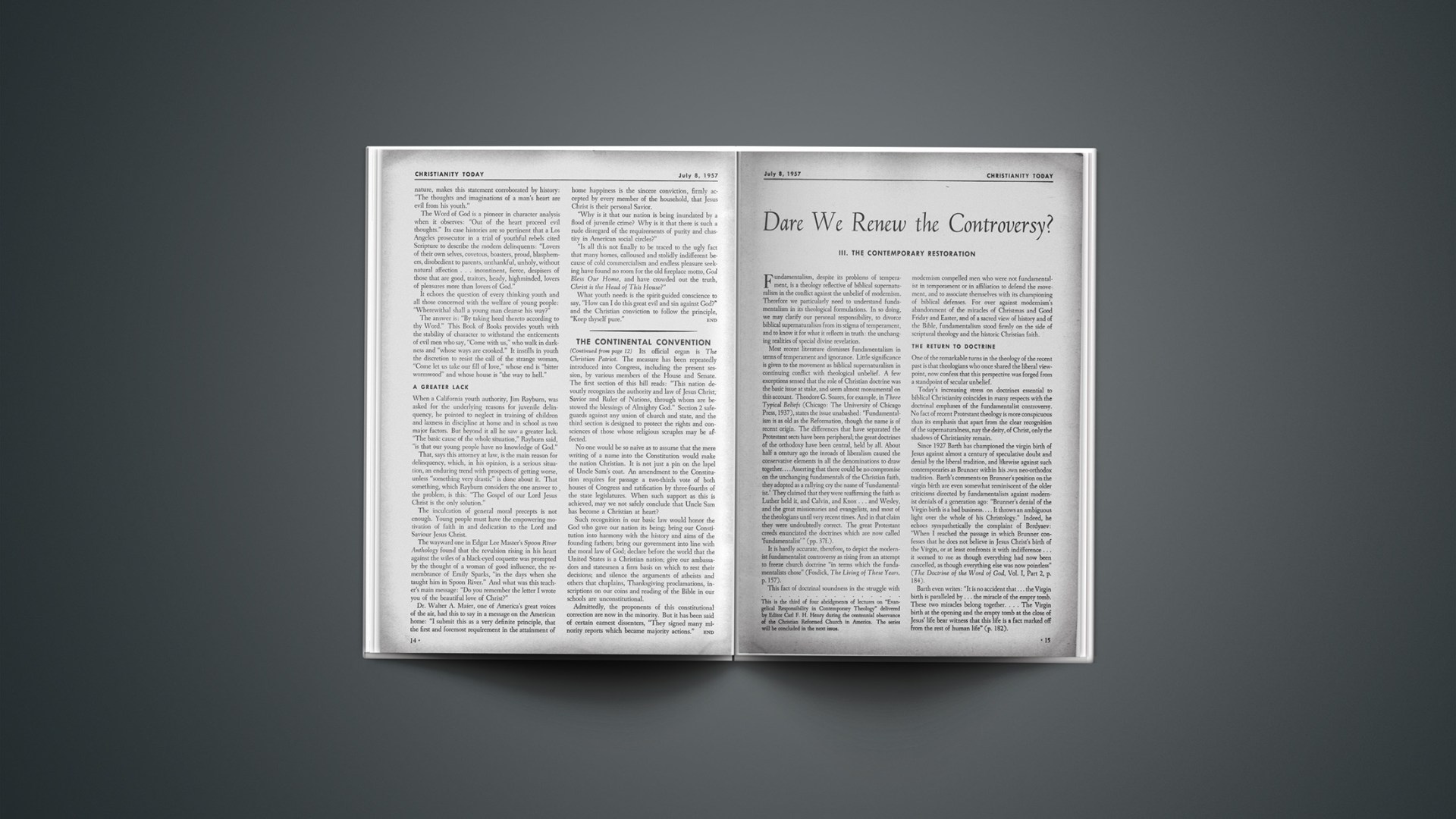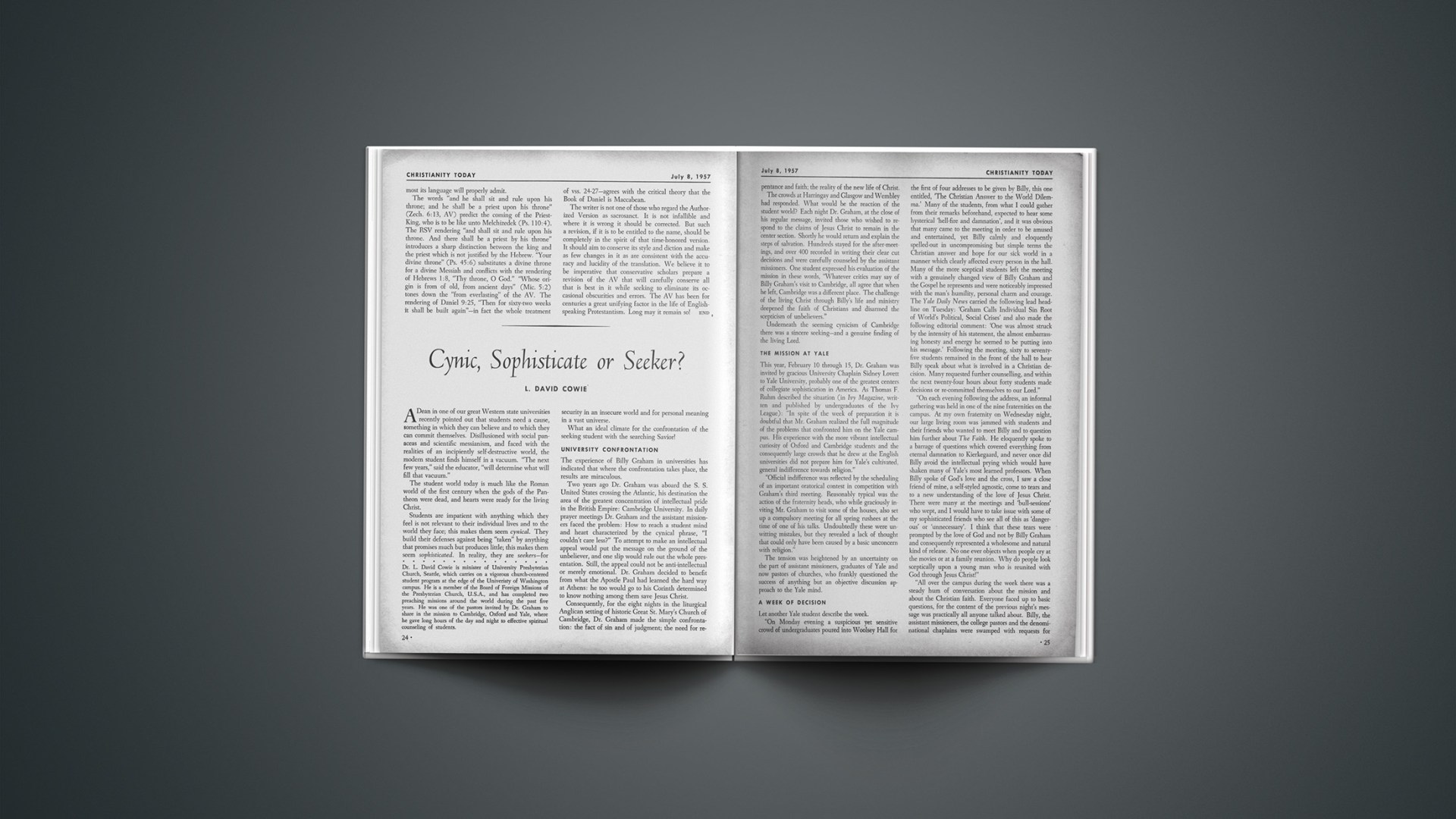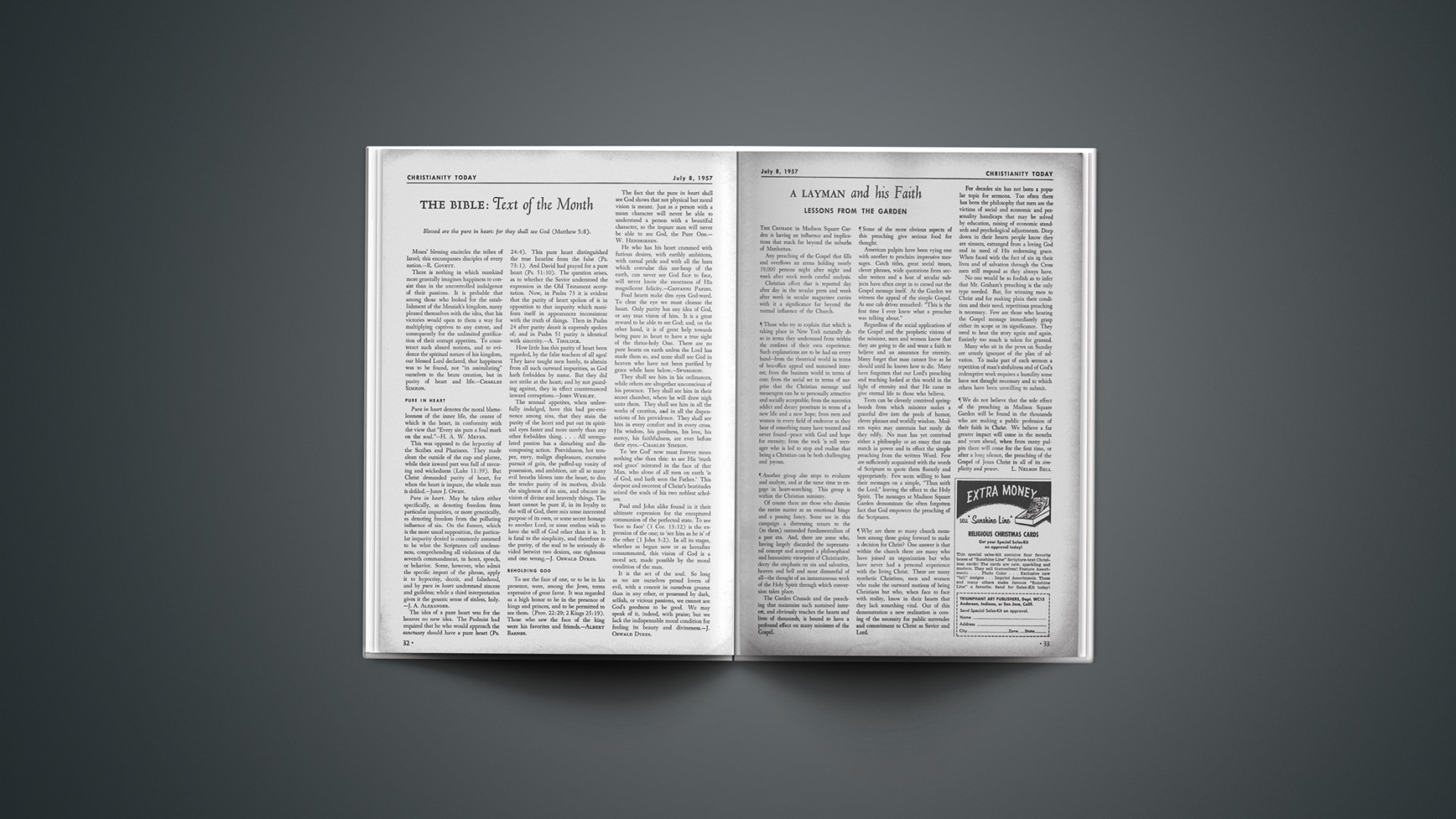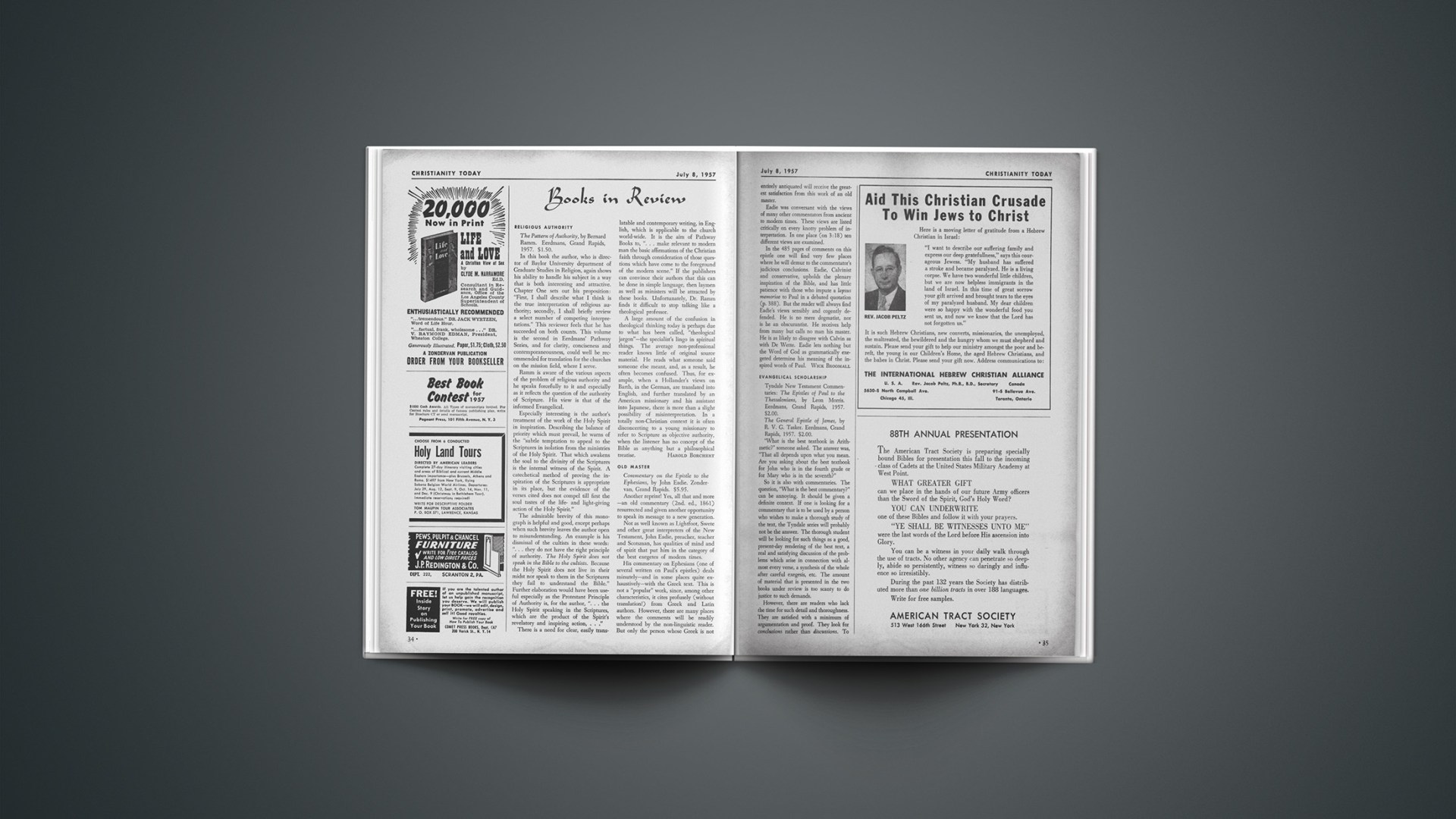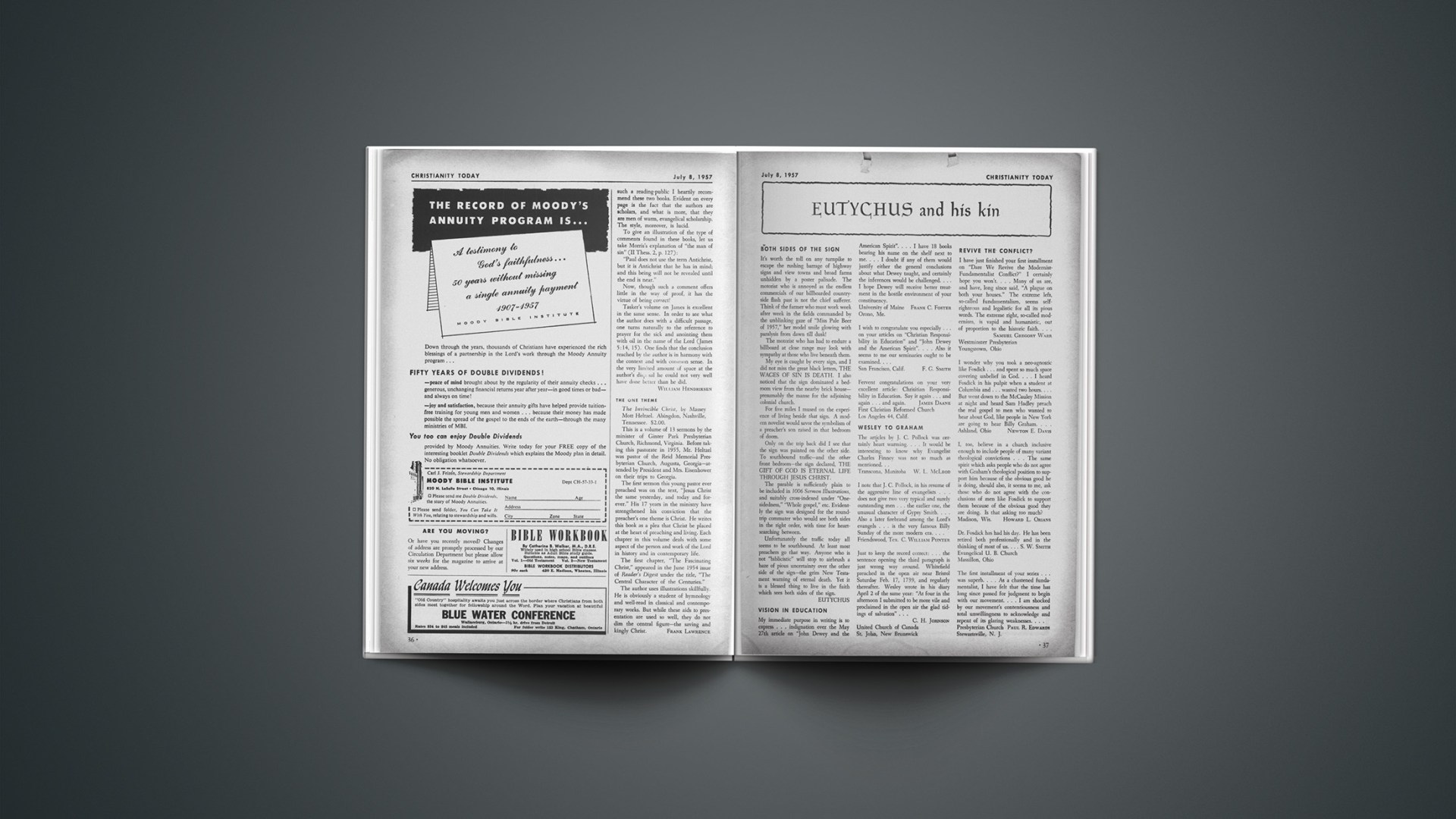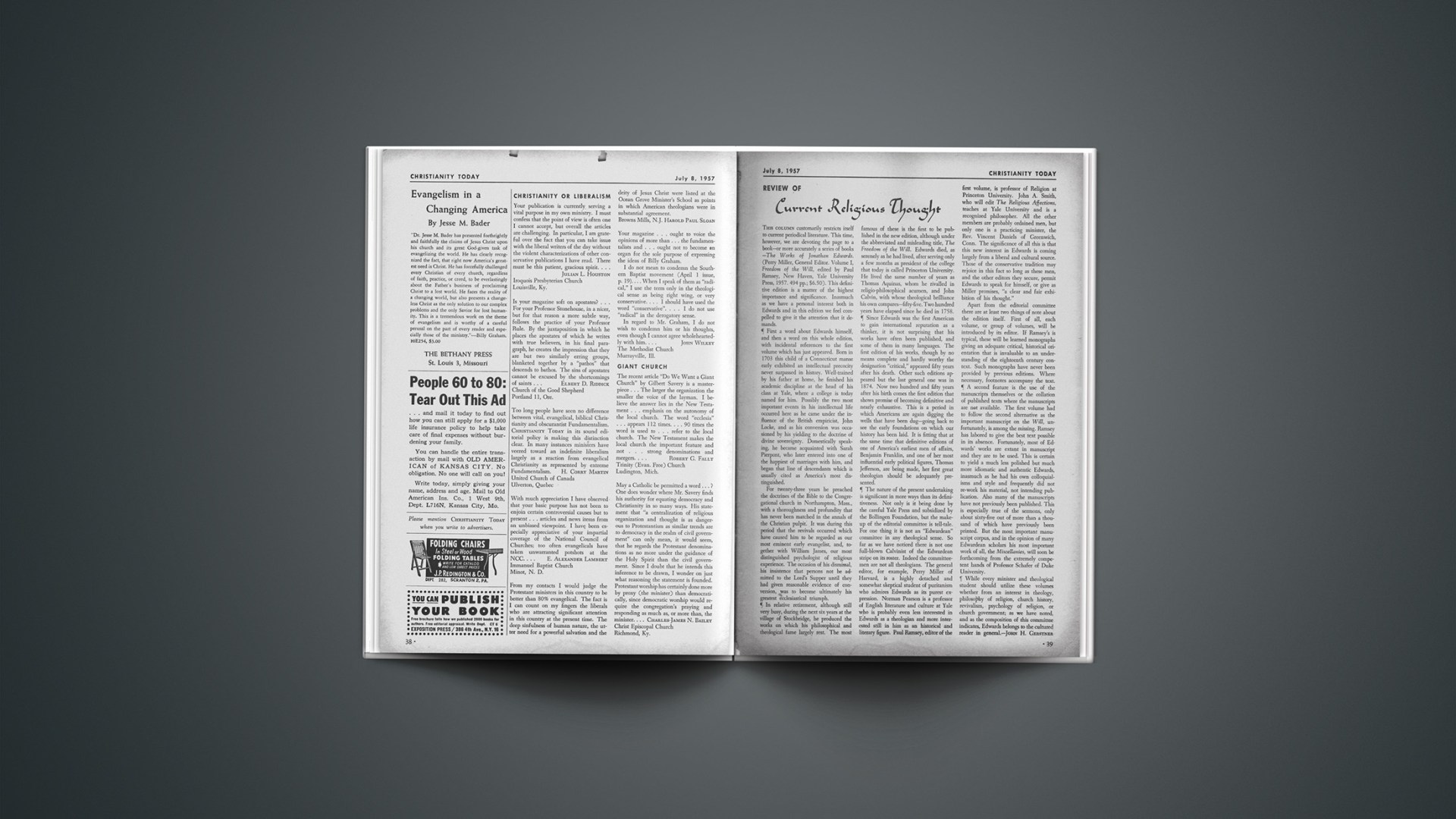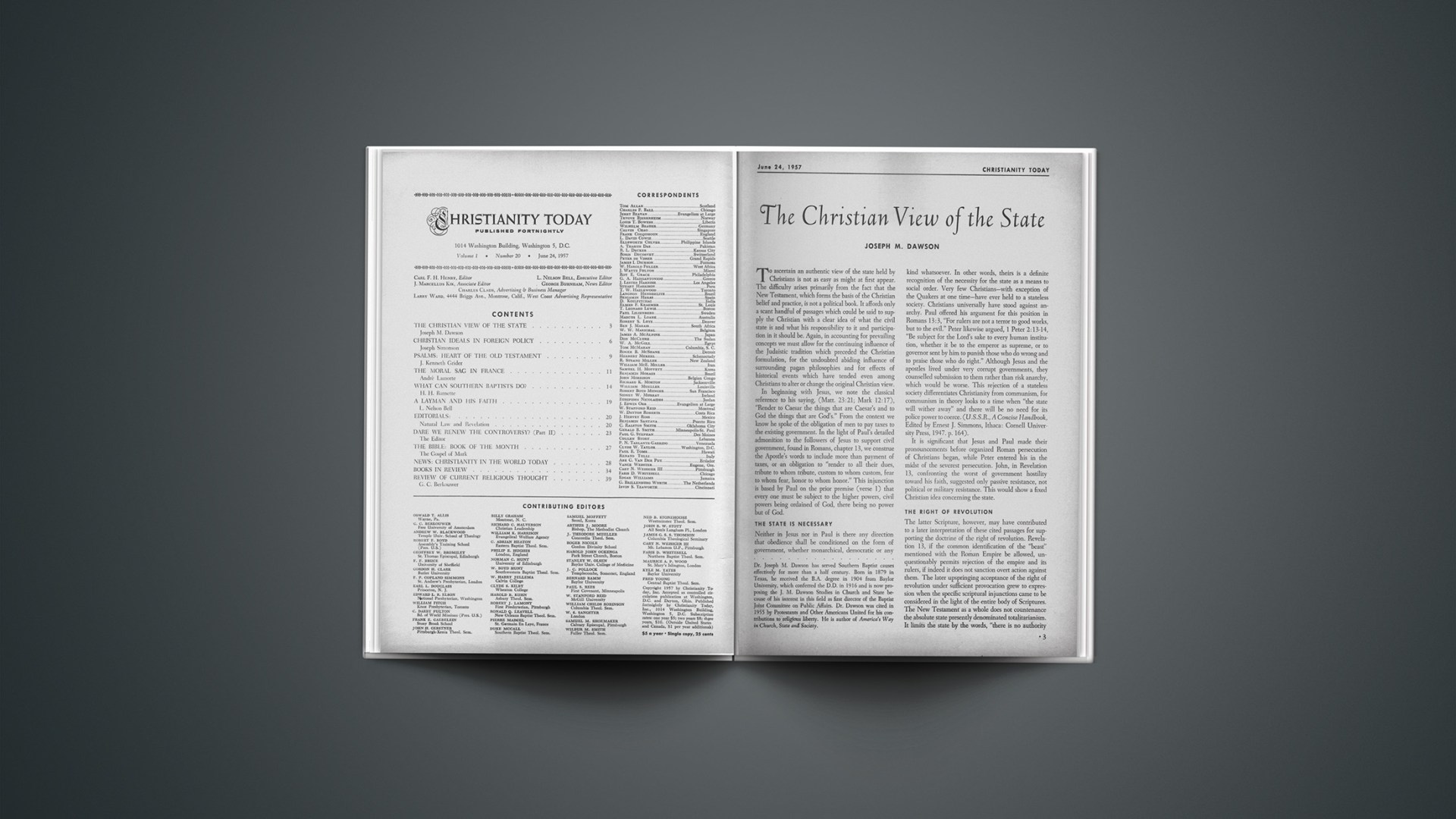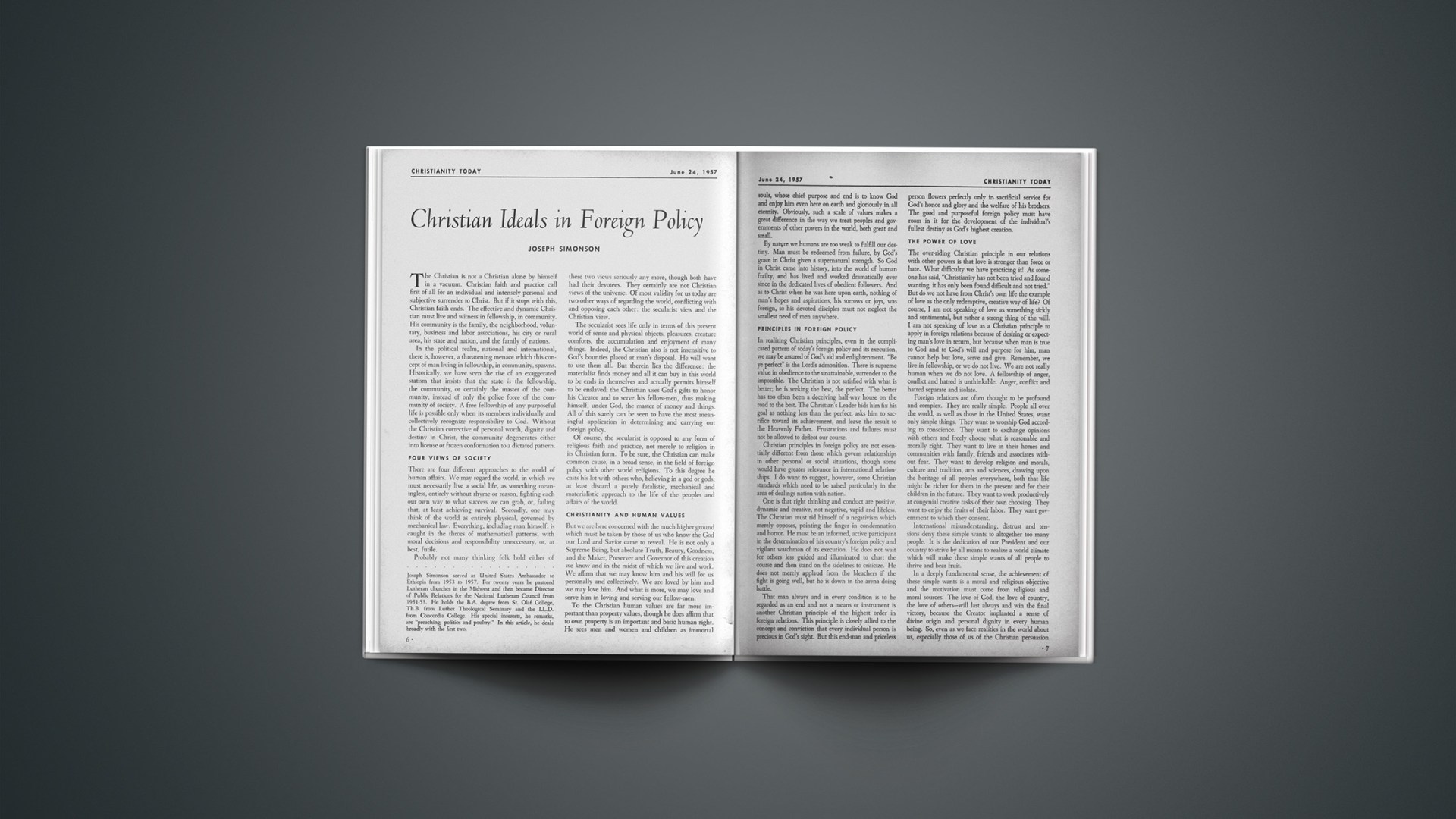Fundamentalism, despite its problems of temperament, is a theology reflective of biblical supernaturalism in the conflict against the unbelief of modernism. Therefore we particularly need to understand fundamentalism in its theological formulations. In so doing, we may clarify our personal responsibility, to divorce biblical supernaturalism from its stigma of temperament, and to know it for what it reflects in truth: the unchanging realities of special divine revelation.
Most recent literature dismisses fundamentalism in terms of temperament and ignorance. Little significance is given to the movement as biblical supernaturalism in continuing conflict with theological unbelief. A few exceptions sensed that the role of Christian doctrine was the basic issue at stake, and seem almost monumental on this account. Theodore G. Soares, for example, in Three Typical Beliefs (Chicago: The University of Chicago Press, 1937), states the issue unabashed: “Fundamentalism is as old as the Reformation, though the name is of recent origin. The differences that have separated the Protestant sects have been peripheral; the great doctrines of the orthodoxy have been central, held by all. About half a century ago the inroads of liberalism caused the conservative elements in all the denominations to draw together.… Asserting that there could be no compromise on the unchanging fundamentals of the Christian faith, they adopted as a rallying cry the name of ‘fundamentalist.’ They claimed that they were reaffirming the faith as Luther held it, and Calvin, and Knox … and Wesley, and the great missionaries and evangelists, and most of the theologians until very recent times. And in that claim they were undoubtedly correct. The great Protestant creeds enunciated the doctrines which are now called ‘fundamentalist’ ” (pp. 37 f.).
It is hardly accurate, therefore, to depict the modernist fundamentalist controversy as rising from an attempt to freeze church doctrine “in terms which the fundamentalists chose” (Fosdick, The Living of These Years, p. 157).
This fact of doctrinal soundness in the struggle with modernism compelled men who were not fundamentalist in temperament or in affiliation to defend the movement, and to associate themselves with its championing of biblical defenses. For over against modernism’s abandonment of the miracles of Christmas and Good Friday and Easter, and of a sacred view of history and of the Bible, fundamentalism stood firmly on the side of scriptural theology and the historic Christian faith.
The Return To Doctrine
One of the remarkable turns in the theology of the recent past is that theologians who once shared the liberal viewpoint, now confess that this perspective was forged from a standpoint of secular unbelief.
Today’s increasing stress on doctrines essential to biblical Christianity coincides in many respects with the doctrinal emphases of the fundamentalist controversy. No fact of recent Protestant theology is more conspicuous than its emphasis that apart from the clear recognition of the supernaturalness, nay the deity, of Christ, only the shadows of Christianity remain.
Since 1927 Barth has championed the virgin birth of Jesus against almost a century of speculative doubt and denial by the liberal tradition, and likewise against such contemporaries as Brunner within his own neo-orthodox tradition. Barth’s comments on Brunner’s position on the virgin birth are even somewhat reminiscent of the older criticisms directed by fundamentalists against modernist denials of a generation ago: “Brunner’s denial of the Virgin birth is a bad business.… It throws an ambiguous light over the whole of his Christology.” Indeed, he echoes sympathetically the complaint of Berdyaev: “When I reached the passage in which Brunner confesses that he does not believe in Jesus Christ’s birth of the Virgin, or at least confronts it with indifference … it seemed to me as though everything had now been cancelled, as though everything else was now pointless” (The Doctrine of the Word of God, Vol. I, Part 2, p. 184).
Barth even writes: “It is no accident that … the Virgin birth is paralleled by … the miracle of the empty tomb. These two miracles belong together.… The Virgin birth at the opening and the empty tomb at the close of Jesus’ life bear witness that this life is a fact marked off from the rest of human life” (p. 182).
While Barth assuredly does not affirm all that an evangelical doctrine of atonement requires, he does speak of the sinless Christ who suffers in our stead (p. 152), bearing the wrath of God which must fall on sinful man (p. 157). Barth writes that God “takes upon Himself the sin and guilt and death of man, that laden with it all He stands surety for man” (p. 378). He writes of “the humanity of Jesus Christ … characterized by the bearing of our sins” and “abandoned to punishment, suffering and death” (p. 428). Barth acknowledges that “with the doctrine of the atonement, we come to the real centre … of dogmatics and Church proclamation” (p. 882).
The doctrine of Christ’s second coming likewise belongs to essential Christianity. In his earlier writings Barth’s eschatological teaching was leavened by an excessive contrast of historical time and eschatological time. This contrast has been modified somewhat, if not yet satisfactorily, by way of reaction to Bultmann’s consignment of the Christological events to myth and symbol. Barth now stresses that the Church exists on earth in the interval between the ascension and the second coming (pp. 692 f.).
Even with respect to Scripture as the norm of Christian doctrine, Barth has given us many statements which, as far as they go, have an evangelical ring. The Church, he tells us, is created and maintained by the Word of God, and is governed by that Word: “by the Word of God in the form of the testimony to the revelation of God in Jesus Christ set down in Scripture. To say that Jesus Christ rules the Church is to say that Holy Scripture rules the Church” (p. 693). Barth not only asserts the priority of the Scriptures over sources of divine knowledge affected by the Fall, but he says bluntly that “if the Church dared simply to abandon the sign of the Bible dominating its worship and instruction, it would be the end of Protestantism” (p. 460). Indeed, he even acknowledges that “the right doctrine of Holy Scripture” “must always be sought and found in exegesis and therefor in Holy Scripture itself” (p. 462).
Dramatic Change
The dramatic element in this theological reversal is simply this: in the first third of our century theological initiative lay with those who labeled the defenders of of these doctrines as obscurantists; today, in contrast, the prominent theological thrust defines the discard and neglect of these doctrines as violence to Christianity. A basic fundamentalist thesis has been vindicated: the intrinsic genius of Christianity demands proclamation of doctrines that fundamentalism upheld in the controversy with liberalism.
It would be overstatement to imply that in the recovery of these doctrinal emphases Barth and the neo-orthodox theologians return in all essentials to an historic evangelical exposition. That is not the case.
Perhaps G. C. Berkouwer has given the most constructive critical evangelical appraisal of Barthian theology in The Triumph of Grace in the Theology of Karl Barth (1956). Without in the least depreciating Barth’s refutation of the older modernism, Berkouwer addresses most pertinent questions to Barth’s “theology of the Word of God,” lest we uncritically assume that the Barthian plea for a Christological-Christocentric theology presents a thoroughly evangelical and biblical exposition of revealed sovereign divine grace in Christ. Philosophical categories in the Barthian exposition of creation, election, reconciliation and eschatology leave Berkouwer quite convinced that the triumphant grace motif in this neo-orthodox form compromises biblical theology and blunts the purity of the Gospel.
Neo-Orthodoxy And The Bible
Important motivational differences distinguish the neo-orthodox from the fundamentalist interest in doctrine. Neo-orthodoxy has no intention of reinstating a fixed and final theology. Indeed, it refuses even to concede that biblical theology is revealed. Doctrines, even prophetic and apostolic doctrines, are treated as devout theological reflection, not as revealed theology.
Beneath this halting return to the Bible lurks a dialectical prejudice that imparts an anti-intellectual turn to the neo-orthodox view of divine self-disclosure and hence to its definitions of revelation and inspiration. God’s revealing activity is sketched in terms of personal encounter beyond the grasp of human concepts, therefore sealing off any divine transmission of truths and words. Nowhere is the Barth-Brunner theology more disappointing than in thus exalting Schleiermacher’s objectionable definition of revelation. Indubitably neo-orthodoxy has supplemented and modified Schleiermacher’s view in numerous details. Its essential point, however, is retained, that God discloses no truths or doctrines involving himself and his purposes. Nowhere does neo-orthodoxy’s loud claim to honor the witness of Scripture fall upon stonier ground than its attempt to justify this anti-intellectual prejudice against the Bible. The evangelical exposition of inspiration has been nearer the heartbeat of the Bible when, in debating the relative merits and defects of the dictation, verbal, and concept theories, it at least held the line against anti-intellectual speculations about divine revelation and inspiration.
Contrary to conservative reliance on an authoritative Bible, the neo-orthodox doctrinal interest retains the liberal methodology. Barth still maintains the requirement, already stated in his early writings, that the Bible as such be distinguished from divine revelation (p. 463). Deference to biblical criticism compromises the religious finality of Scripture in the historic evangelical sense. To more than one interpreter Barthian dogmatics seems indeed marked for frustration in endeavoring to preserve the Bible as the witness of revelation, while at the same time restricting it as a witness to revelation. For this controlling postulate cannot survive the test of Scripture’s implications and assertions about itself. Here evangelical theology, insisting that the Divine Logos and Speech is addressed in human conceptions and words—how else could it be revelation?—is assuredly on the side of the biblical witness.
Barth indeed speaks of the “inspiringness” of the Bible, of its character as a frame wherein one is confronted by the encountering Christ. He fails, however, to acknowledge that inspiration or “inspiredness” which the New Testament ascribes to Scripture (2 Tim. 3:16), and on which evangelical theology therefore insists. The many passages in which the Old Testament prophets claim to convey the very words of God gain from Brunner the grudging admission of “a low order of revelation.” Yet nowhere does he reconcile this concession to verbal revelation with his basic theory of revelation as uncommunicable in concepts and words.
Barth, to be sure, tells us in a refreshing passage that “the biblical texts must be investigated for their own sake to the extent that the revelation which they attest does not stand or occur, and is not to be sought, behind or above them but in them.… If it is asked whether Christianity is really a book-religion, the answer is that strangely enough Christianity has always been and only been a living religion when it was not ashamed to be actually and seriously a book-religion” (pp. 494 ff.). Often his writings disclose a concern for textual and exegetical considerations that renegade liberalism had snubbed, and that even yet is lacking in some neo-orthodox theologians. Yet when Barth erpounds what Scripture teaches about its own inspiration, he reflects the prejudices of the dialectical theology. The dialectical evasion of the rational and verbal coherence of the Bible circumvents a doctrine of the inspiration of Scripture that corresponds to the witness of Scripture itself.
Barth wrongly invokes the witness of the Spirit to offset the need for stabilizing the words of Scripture as the Word of God. Nowhere does Barth really prove his case that the traditional view interposes the Bible as a “paper Pope” between Christ and the Church. Actually the modernist compromise of the authority of the Bible enabled critics to usurp the Lordship of Christ in the theological realm.
Christ And The Scriptures
There is a further consequence of deserting the high view of inspiration. Scripture itself loses the right to delineate the essential elements of the person and work of Jesus Christ. Although neo-orthodoxy calls for a revival of biblical theology, its formulation of Christian doctrine stresses whatever allegedly agrees with the revelation of the person of Christ. And evangelical theology must show enthusiasm for the Christocentric phrasing of revealed theology. But in neo-orthodoxy this principle operates critically and selectively in evaluating the data of Scripture. Scripture thereby no longer serves to refract what coheres with Christ’s person. Consequently, subjective factors constantly threaten the construction of Christian doctrine. This is seen in Brunner’s indifference to the doctrine of the virgin birth, despite Barth’s assertion that “the narratives of the Virgin birth were admitted to share in the gospel witness because of a certain inward, essential rightness and importance in their connection with the person of Jesus Christ” (p. 176). It is seen also in Brunner’s indifference to the empty tomb in relation to faith in Christ’s resurrection, whereas Barth notes that “its most illuminating moment” according to Mark’s Gospel “consists in the inconceivable fact of an empty sepulchre” (p. 114 f.), and that this outward sign guards against reducing resurrection from an event to a speculative idea (p. 179).
Barth’s speculative premises about divine self-revelation not only shape his departure from the historic view of Scripture, but determine also his general attenuation of evangelical doctrines, including his bias against the exposition of propitiation in the doctrine of atonement. Whenever convenient, neo-orthodoxy does not hesitate to shift its appeal from the nature of Christ to the witness of Scripture. But because the evangelical principle of the organic unity of the Bible is compromised, the dialectical approach accomplishes only a limited return to biblical theology and provides only a relative opposition to liberal theology. A crucial illustration is the hesitancy of dialectical theologians to maintain the full identity of Jesus of Nazareth with the Christ; the historical Jesus is for them a witness to the Christ. Here the detachment of the Christological from the scriptural principle actually threatens the central faith of the New Testament, namely, that Jesus of Nazareth is the zenith of divine self-revelation.
Immanence And Transcendence
Nonetheless, the new theology properly rejects the liberal doctrine of extreme immanence, to which the central Christian concepts had been conformed or had been deleted. The neo-orthodox statement of divine transcendence, however, appears reactionary. Whereas this new formulation of transcendence readmits some traditional and biblical fundamentals (e.g., the virgin birth, the bodily resurrection), it excludes others (e.g., propitiatory atonement) through its stress on God in his self-revelation as being always “subject, never object.” An exaggerated doctrine of divine transcendence is as harmful to the fortunes of biblical theology as an excessive doctrine of divine immanence. Twentieth-century theology incorporates this vulnerable approach to Scripture with speculative preconceptions of either divine transcendence or immanence. By imposing this procedure on biblical data, some elements of scriptural theology are accepted, others rejected. Actually, the limits of transcendence and immanence are fixed by all, not merely by some, Bible events and doctrines. It is this totality which guards against speculative distortions. Genuinely biblical theology views the divinely inspired Scriptures as the font from which, and from which alone, a trustworthy and adequate statement can be derived of those important and essential elements whose inward connection with the person of Christ must be maintained. Only the preservation of the total scriptural revelation justifies a theology’s claim to be biblical.
Divine-Human Encounter
Neo-orthodox theology has enlivened present theological discussion with a new, and rather wholesome, sensitivity to divine confrontation. The Christianity of the twentieth century had quite obscured the God who continually encounters and confronts man. Modernism had exchanged the divine initiative in special revelation for the human quest for God. Fundamentalism had stressed Christian experience in terms of doctrinal assent and outward social restraints, appended of course to an initial experience of rebirth whose vitality was to be renewed in periodic crises of spiritual surrender. Ritualistic churches dulled the edge of divine-human encounter through their recital of good news in a form which often struck modern men as monotonous and impotent. Twentieth-century man was face to face with death at every moment; if Christianity was to retain its relevance for him, it must somehow preserve him each moment face to face with life, with the ultimate, with God. The contemporary approximation of the New Testament emphasis on spiritual immediacy as preserved by the religion of the Mediator is therefore a gain. We who minister to this tensed generation dare not neglect the continual unveiling of God in Christ encountering every lost soul in creation, preservation, conscience, judgment, and the call to repentance and faith. Nor dare we neglect the sway of the confronting Christ over our own souls, framed by creation and refashioned by redemption primarily for a life of personal fellowship in his service. The disregard of this dimension of Christianity has doubtless done more to provoke the rise of modern religious cults than any other factor.
Sign Of Weakness
At the same time, the incessant neo-orthodox laboring of the theme of confrontation and encounter betrays a weakness. This neo-orthodox travail follows from the failure to adequately correlate the dynamics of present Christian experience with New Testament revelation. The fundamentalist confidence in a specially inspired communication of the knowledge of God and his purposes is sound. Scripture is not reducible to exalted religious insight; it is a literature of theological conviction uniquely shaped within an orbit of special divine revelation and inspiration. Nay, it is more; it is the normative and authoritative statement by which Christian faith and doctrine must be tested.
Task Of Christian Philosophy
A fresh exploration of the interrelations of revelation and reason (in view of man’s possession of the image of God created and sullied, and renewed in redemption) is one of the present imperatives. The historic Augustinian-Calvinistic conception of the relation of revelation and reason holds magnificent relevance for a generation reaching for a transcendent God, while yet concerned for the rational integration of all life’s experiences. Modernism’s surrender to the secularization of science, of education, and of cultural pursuits generally resulted directly from separating these spheres from the claims of revelation.
The way theology defines the relation of revelation and reason will color its comprehension of Christianity and culture, Christianity and science, Christianity and philosophy, no less than the exposition of Christian doctrine and apologetics. If divine revelation stands in essential contrast to human reason, or if it impinges only dialectically upon the human mind, so that divine revelation cannot be grasped in concepts and words, then a Christian philosophy is a vain hope. It is part of the glory of evangelical theology that it rises above the modern contrast between God-truth and world-truth which divides human reason and precludes the intellectual integration of experience.
The recovery of interest in special divine revelation is one of the gracious providences of our century. It comes significantly at a time when the world must contend with the tactical initiatives of Communism and of irreligion. Protestant modernism deflected Western Christianity’s theological interest from biblical revelation to natural theology.
This retrograde idealistic philosophy only briefly resisted a further decline to humanism. Evangelicals once reveled in the divine oracles; the modernists now asked whether God exists. Modernism’s surrender of biblical revelation finally enmeshed American Christianity in the loss of the self-revealed God; in the noncommunist world, as well as the communist, naturalism surged to ascendancy. Now that special revelation is Once again recognized as integral to Hebrew-Christian redemptive religion, it becomes a duty of evangelical theology to conserve this gain, and to shield it from speculative misunderstanding.
The message of divine creation and redemption comprehends both the individual life in its private growth and the redeemed man in all his social and cultural life. The awareness of biblical revelation as relevant to the whole of life grants contemporary civilization the living prospect of a rationally satisfying explanation of human aspirations and problems.
TO BE CONTINUED
This is the third of four abridgments of lectures on “Evangelical Responsibility in Contemporary Theology” delivered by Editor Carl F. H. Henry during the centennial observance of the Christian Reformed Church in America. The series will be concluded in the next issue.
